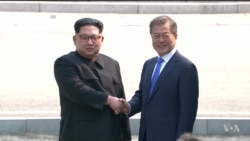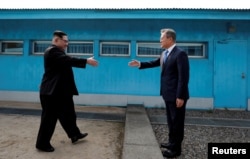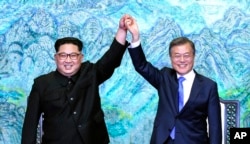Optimism abounds in Seoul following the historic summit between North Korean leader Kim Jong Un and South Korean President Moon Jae-in.
From that symbolic step across the border, marking the first time a North Korean leader had ever entered South Korean territory, to the jovial moment when Kim invited Moon to step back over the border into the North, to the animated conversation the two leaders had as they sat alone for 30 minutes, to the joint declaration proclaiming that a new era of peace has begun, the inter-Korean summit has left many in Seoul feeling hopeful about the future.
“I was very thrilled while watching it. It was a time that gave me hope that unification may come very soon,” said Seoul resident Lee Se-jin.
To many viewing the summit the young North Korean leader also came across as more reasonable and open to change, than the authoritarian figure who in the past has repeatedly threatened to launch nuclear strikes against his enemies.
“He seemed to be very authoritative as a dictator, but he gave a positive impression that he is daring, smart and bold,” said Yoon Young-gil, who also lives in the South Korean capital.
Complete denuclearization
At the summit, Kim agreed to the complete denuclearization of the Korean Peninsula.
North Korea has unilaterally suspended nuclear and missile tests, and officials in Seoul said Pyongyang would invite international experts and journalists to witness the closing of the country’s nuclear test site in May.
The two leaders reaffirmed a past non-aggression agreement and agreed to pursue a number of reconciliation measures that include working for a peace treaty to replace the armistice in place that ended the Korean War in 1953, establishing a joint liaison office to facilitate cross border dialogue, and restarting the reunions of families that have been separated by the division of the country.
On Monday, South Korea said it would remove loudspeakers that blared propaganda across the border, while North Korea said it would shift its clocks to align with the time zone used in the South.
Public Approval
A South Korean survey taken following the summit by Realmeter showed that over 64 percent of respondents believe the North will denuclearize and keep peace on the Korean peninsula.
President Moon’s approval rating also increased to over 70 percent for the first time in four months. Even some conservative voters who did not support the liberal president now give him credit for persistently pursuing diplomatic engagement.
“Even after Moon Jae-in became president, as I was a conservative, I did not have a favorable feeling of him, but he seems to be sincere and responsible with his words, that make others trust him,” said Hong Soon-Dok who did not vote for Moon in last year’s presidential election in South Korea.
Irreversible steps
The joint denuclearization declaration, however, is just the beginning of the negotiation process. Next up, the meeting between U.S. President Donald Trump and Kim that is expected to take place before July.
While the Trump administration has been supportive of the progress made so far, it wants to see irreversible reductions in the North’s nuclear program before agreeing to reduce economic sanctions.
Trump's new national security adviser John Bolton, in an interview on Sunday, said Kim may have "concrete and tangible" ideas about giving up his nuclear arms program "and we should hear him out."
But he and U.S. Secretary of State Mike Pompeo s cautioned that North Korea has a history of reneging on its commitments.
Bolton also urged the leadership in Pyongyang to release three Americans being held in captivity in North Korea as a "demonstration of their sincerity.”
Two Korean-American academics and a Christian missionary, as well as a Canadian pastor and three South Korean nationals have been arrested in the North for allegedly conducting missionary work that is banned in the communist state. Japan says at least several dozen of its nationals are also being held in the country.
Lee Yoon-jee in Seoul contributed to this report.









